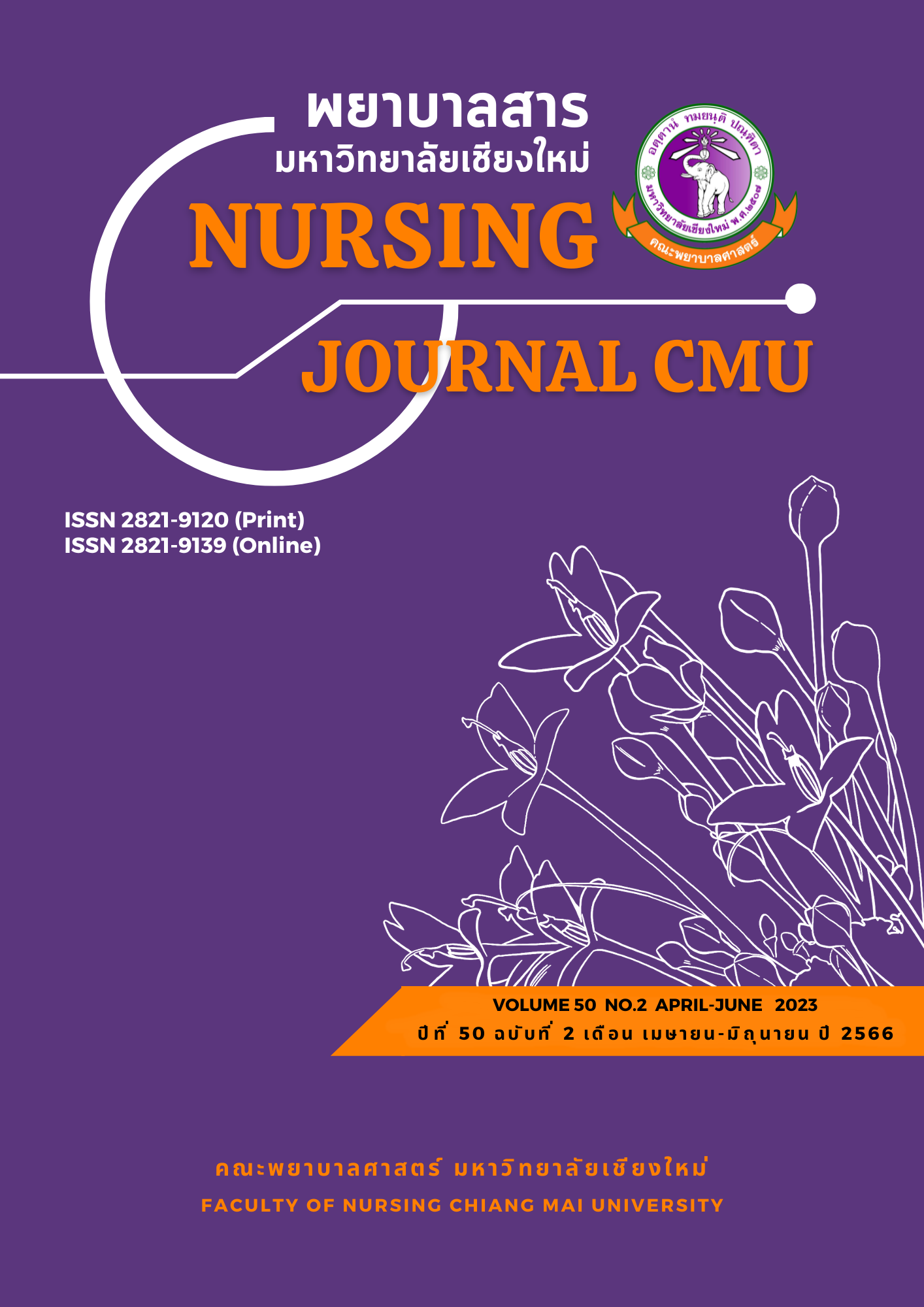ความสัมพันธ์ระหว่างความรู้ ทัศนคติ และการรับรู้สมรรถนะแห่งตนในการส่งเสริม การทำพินัยกรรมชีวิตของพยาบาลวิชาชีพที่ปฏิบัติงานในหอผู้ป่วยวิกฤต
คำสำคัญ:
ความรู้, ทัศนคติ, การรับรู้สมรรถนะแห่งตน, การทำพินัยกรรมชีวิตบทคัดย่อ
ความรู้ ทัศนคติ และการรับรู้สมรรถนะแห่งตนของพยาบาลวิชาชีพ เป็นปัจจัยที่มีความสำคัญในการส่งเสริมการทำพินัยกรรมชีวิตในผู้ป่วยวิกฤต การวิจัยแบบพรรณนาความสัมพันธ์นี้มีวัตถุประสงค์เพื่อศึกษาระดับและความสัมพันธ์ระหว่างความรู้ ทัศนคติ และการรับรู้สมรรถนะแห่งตนในการส่งเสริมการทำพินัยกรรมชีวิตของพยาบาลวิชาชีพที่ปฏิบัติงานในหอผู้ป่วยวิกฤต กลุ่มตัวอย่างคือพยาบาลวิชาชีพ จำนวน 154 คนที่ปฏิบัติงานใน
หอผู้ป่วยวิกฤตในโรงพยาบาลสังกัดมหาวิทยาลัยแห่งหนึ่ง เครื่องมือที่ใช้ในการดำเนินการวิจัยประกอบด้วย 1) แบบบันทึกข้อมูลส่วนบุคคล 2) แบบสอบถามความรู้เกี่ยวกับการส่งเสริมการทำพินัยกรรมชีวิต 3) แบบสอบถามทัศนคติเกี่ยวกับการส่งเสริมการทำพินัยกรรมชีวิต และ 4) แบบสอบถามการรับรู้สมรรถนะแห่งตนเกี่ยวกับการส่งเสริมการทำพินัยกรรมชีวิต วิเคราะห์ข้อมูลโดยใช้สถิติพรรณนา และสถิติ Pearson’s correlation coefficients
ผลการศึกษาพบว่า คะแนนความรู้ในการส่งเสริมการทำพินัยกรรมชีวิตของพยาบาลวิชาชีพอยู่ในระดับสูง คะแนนทัศนคติ และคะแนนการรับรู้สมรรถนะแห่งตนในการส่งเสริมการทำพินัยกรรมชีวิตอยู่ในระดับปานกลาง สำหรับความสัมพันธ์ระหว่างตัวแปรพบว่า ทัศนคติมีความสัมพันธ์ในทิศทางบวกกับการรับรู้สมรรถนะแห่งตนในการส่งเสริมการทำพินัยกรรมชีวิตอย่างมีนัยสำคัญทางสถิติ (r = .28, p < .05) แต่ความรู้ไม่มีความสัมพันธ์กับการรับรู้สมรรถนะแห่งตนในการส่งเสริมการทำพินัยกรรมชีวิต (p > .05)
ผลการวิจัยครั้งนี้สามารถใช้เป็นข้อมูลพื้นฐานในการพัฒนาสมรรถนะของพยาบาลวิชาชีพในหอผู้ป่วยวิกฤต อย่างไรก็ตามการศึกษานี้ทัศนคติมีความสัมพันธ์ในทิศทางบวกกับการรับรู้สมรรถนะแห่งตน แต่ความรู้ไม่มีความสัมพันธ์กับการรับรู้สมรรถนะแห่งตน การศึกษาครั้งต่อไปจึงควรศึกษาตัวแปรอื่น ๆ เพื่อเป็นข้อมูลพื้นฐานในการพัฒนาสมรรถนะของพยาบาลในการส่งเสริมการทำพินัยกรรมชีวิตในผู้ป่วยวิกฤตต่อไป
เอกสารอ้างอิง
AlFayyad, I. N., Al-Tannir, M. A., AlEssa, W. A., Heena, H. M., & Abu-Shaheen, A. K. (2019). Physicians and nurses’ knowledge and attitudes towards advance directives for cancer patients in Saudi Arabia. PLoS One, 14(4), 1-13. doi: 10.1371/journal.pone.0213938
Alsayed, E. F., Tayeb, B. O., & Boker, A. (2022). Advanced medical directives or written living wills among Saudi intensive care units, current practice and need to optimization: Opinion of trainees. Saudi Critical Care Journal, 6(2), 50-57.
Bandura, A. (1997). Self-efficacy: The exercise of control. New York: W.H. Freeman.
Best, J. W. (1981). Research in Education. New Delhi: Prentice Hall.
Bloom, B. S. (1975). Taxonomy of educational objectives: The classification of educational goals. Handbook: Cognitive domain. New York: David McKay.
Broden, E. G., Deatrick, J., Ulrich, C., & Curley, M. A. (2020). Defining a “good death” in the pediatric intensive care unit. American Journal of Critical Care, 29(2), 111-121. doi: 10.4037/ajcc2020466
Bussa, P., Pornpiboon, P., & Sittisombut, S. (2019). Knowledge and attitude regarding advance directives for end of life care among physicians and nurses. Nursing Journal, 46(3), 38-48. (in Thai)
Carr, D., & Luth, E. A. (2019). Well-being at the end of life. Annual Review of Sociology, 45, 515–534. doi: 10.1146/annurev-soc-073018-022524
Coffey, A., McCarthy, G., Weathers, E., Friedman, M. I., Gallo, K., Ehrenfeld, M., … Itzhaki, M.(2016). Nurses' knowledge of advance directives and perceived confidence in end-of-life care: A cross-sectional study in five countries. International Journal of Nursing Practice, 22(3), 247–257. doi: 10.1111/ijn.12417
Gilissen, J., Pivodic, L., Wendrich-van Dael, A., Cools, W., Vander Stichele, R., Van den Block, L., ... Gastmans, C. (2020). Nurses’ self-efficacy, rather than their knowledge, is associated with their engagement in advance care planning in nursing homes: A survey study. Palliative Medicine, 34(7), 917-924. doi: 10.1177/0269216320916158
Hemnoot, N., Junda, T., & Phinitkhajorndech, N. (2021). Correlation among knowledge, attitude, and self-efficacy of professional nurses in facilitating patients’ advance directive. Journal of Nursing and Health Care, 39(2), 49-57. (in Thai)
Ho, M. H., Liu, H. C., Joo, J. Y., Lee, J. J., & Liu, M. F. (2022). Critical care nurses’ knowledge and attitudes and their perspectives toward promoting advance directives and end-of-life care. BMC Nursing, 21(1), 1-8. doi: 10.1186/s12912-022-01066-y
Kangwansura, R., Tienthavorn, T., Srisuwan, P., & Gesakomol, K. (2022). Factors affecting older adults’ decision-making on having a living will. Journal of Primary Care and Family Medicine, 5(1), 33-44. (in Thai)
Kastbom, L., Milberg, A., & Karlsson, M. (2017). A good death from the perspective of palliative cancer patients. Supportive Care in Cancer: Official Journal of the Multinational Association of Supportive Care in Cancer, 25(3), 933–939. doi: 10.1007/s00520-016-3483-9
Kurin, M., & Mirarchi, F. (2021). The living will: Patients should be informed of the risks. Journal of Healthcare Risk Management, 41(2), 31-39. doi: 10.1002/jhrm.21459
Loknimith, W., Janda, T., & Sumdaengrit, B. (2020). Self-perceived palliative care competencies of nurse working in a university hospital within less than two years of receiving bachelor’s degrees. Journal of The Royal Thai Army Nurses, 21(3), 373-381. (in Thai)
Matchim, Y., Thongthawee, B., Raetong, P., & Kanhasing, R. (2022). Quality of death and its related factors in terminally ill patients, as perceived by nurses. International Journal of Palliative Nursing, 28(10), 491–496. doi: 10.12968/ijpn.2022.28.10.491
Ozga, D., Wozniak, K., & Gurowiec, P. J. (2020). Difficulties perceived by ICU nurses providing end-of-life care: A qualitative study. Global Advances in Health and Medicine, 7(9), 1-8. doi: 10.1177/2164956120916176
Phurithummachote, P. (2016). Attitudes towards living wills and factors affecting living wills writing decisions of Borabue Hospital’ patients. Academic Journal of Mahasarakham Provincial Public Health Office, 1(1), 39-50. (in Thai)
Poveda-Moral, S., de la Casa, P. J. M., Sánchez-Valero, P., Pomares-Quintana, N., Vicente-García, M., & Falcó-Pegueroles, A. (2021). Association between knowledge and attitudes towards advance directives in emergency services. BMC Medical Ethics, 22(1), 1-15.
Sedini, C., Biotto, M., Crespi Bel'skij, L. M., Moroni Grandini, R. E., & Cesari, M. (2022). Advance care planning and advance directives: An overview of the main critical issues. Aging Clinical and Experimental Research, 34(2), 325–330. doi: 10.1007/s40520-021-02001-y
Sujaritwarakul, M., & Somanusorn, S. (2018). Factors related to death preparation among Thai Buddhist elderly. Kuakarun Journal of Nursing, 25(1), 154-169. (in Thai)
Vazquez-Campo, M., Tizon-Bouza, E., Martínez-Santos, A. E., & Vilanova-Trillo, L. (2020). What do Galicia's nurses know about living wills? Enfermería Clínica (English Edition), 30(1), 16-22. doi: 10.1016/j.enfcli.2019.09.017
Yang, J., Kim, H. J., Heo, S., An, M., Park, S., Ounpraseuth, S., … Kim, J. (2023). Factors associated with attitudes toward advance directives in nurses and comparisons of the levels between emergency nurses and palliative care nurses. Japan Journal of Nursing Science: JJNS, 20(1), e12508. doi: 10.1111/jjns.12508
ดาวน์โหลด
เผยแพร่แล้ว
รูปแบบการอ้างอิง
ฉบับ
ประเภทบทความ
สัญญาอนุญาต
ลิขสิทธิ์ (c) 2023 พยาบาลสาร

อนุญาตภายใต้เงื่อนไข Creative Commons Attribution-NonCommercial-NoDerivatives 4.0 International License.
บทความที่ได้รับการตีพิมพ์เป็นลิขสิทธิ์ของวารสารพยาบาลสาร
ข้อความที่ปรากฏในบทความแต่ละเรื่องในวารสารวิชาการเล่มนี้เป็นความคิดเห็นส่วนตัวของผู้เขียนแต่ละท่านไม่เกี่ยวข้องกับมหาวิทยาลัยเชียงใหม่ และคณาจารย์ท่านอื่นๆในมหาวิทยาลัยฯ แต่อย่างใด ความรับผิดชอบองค์ประกอบทั้งหมดของบทความแต่ละเรื่องเป็นของผู้เขียนแต่ละท่าน หากมีความผิดพลาดใด ๆ ผู้เขียนแต่ละท่านจะรับผิดชอบบทความของตนเองแต่ผู้เดียว






